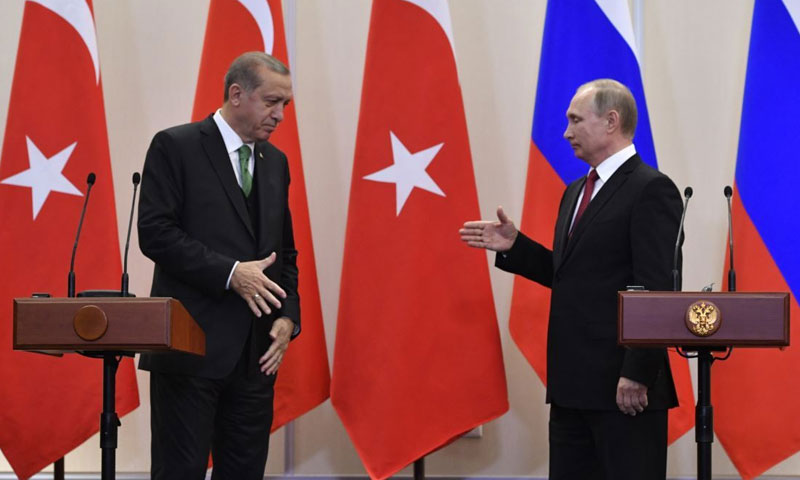



Turkey and Russia have agreed on a new ceasefire in Syria’s war-torn province of Idlib, according to what the two sides declared despite their disagreement over the implementation date.
This is considered the third agreement made between Turkey and Russia regarding the province of Idlib, as it was preceded by two agreements that did not last for long; the Syrian regime forces, backed by Russian airpower were violating the cease-fire agreements by launching several attacks on the cities and villages in the countryside of Hama and Idlib.
Turkey’s Defense Ministry said on 10 January in a statement that it had agreed with Russia on the implementation of the cease-fire on 12 January within the Idlib de-escalation zone, stopping air/ground attacks.
The cease-fire will take effect in Idlib province at 00:01 am (local time- 2101GMT), 12 January.
The Turkish announcement was preceded by a statement by the Head of the Russian Defence Ministry’s Syria reconciliation center, Major-General Yuri Borenkov, who, according to Tass, a Russian state-controlled news service, said that “the implementation of the ceasefire in Idlib began at 2:00 am local time (1100 GMT) on Friday, 10 January.
Despite the two announcements, the news coming from Idlib until Saturday, 11 January does not see a halt to airstrikes by the regime forces with Russian support, as shelling and several aerial bombardments were recorded in the province.
15 civilians were killed, and 94 others were injured as a result of intense aerial raids by the Syrian warplanes on the city of Idlib and its eastern and southern countryside on 11 January, Mustafa Haj Youssef, the director of the Civil Defense in Idlib, told Enab Baladi.
A military escalation has taken place in the province of Idlib since 19 December 2019. The Syrian regime forces, backed by Russia, launched a military offensive along with intensive airstrikes against the city of Maraat al-Numan and its countryside, leading to emptying the region of its population despite the repeated condemnation by the international community and the United Nations over these attacks.
Thus, al-Assad regime established control over 31 villages with an area of about 320 square kilometers.
In September 2018, Russian President Vladimir Putin and his Turkish counterpart Recep Tayyip Erdogan laid the cornerstone for the fate of Idlib province, after a bilateral summit in Sochi, Russia.
The text of the Sochi agreement, which includes ten terms, reads as follows:
“The Republic of Turkey and the Russian Federation, as guarantors of the observance of the cease-fire regime in the Syrian Arab Republic, and guided by the memorandum on establishing the de-escalation areas within the Syrian Arab Republic, on 4 May 2017, and the arrangements made in the Astana Process, with the aim of achieving stability in the conditions within the de-escalation zone in Idlib as soon as possible, they agreed on the following:
Although the terms of this agreement have not been fully implemented, Moscow and Ankara consider them the cornerstone of what the region will be like in the future.
In their latest statements on the agreement, the two sides say they are still in force, but they face difficulties and problems.
On 27 August 2019, the Russian Defense Minister, Sergei Shoyogo, said that the implementation of the “Russian-Turkish agreement on the Idlib region is difficult and tense,” stressing that “Turkey conducts patrols within the de-escalation zone, while Russian patrols continue outside it.”
A tripartite summit between Iran, Russia and Turkey was held on 16 September 2019 in the Turkish capital, Ankara and focus on the situation in Syria.
At that time, the three leaders of Turkey, Russia, and Iran announced that they agreed to form a committee tasked with re-writing Syria’s constitution as part of a political solution to the country’s civil war.
As for the province of Idlib and its fate, Putin said, “We agreed with Erdoğan, Rouhani to take concrete steps to de-escalate tensions in Idlib.”
Putin added, according to Russian media outlets, at the end of the summit, “Russia intends to support the Syrian Arab Army during its limited military operations aimed at containing and routing the terrorist threat, where it appears,” stressing that the ceasefire regime “will never exclude terrorists.”
After the summit, Russia announced a unilateral ceasefire in northwestern Syria, where Russian-backed Syrian regime forces had been carrying out a fierce large-scale military operation and where the Syrian regime forces took full control over the northern countryside of Hama and Khan Sheikhoun, the strategic city located on the Damascus-Aleppo international highway.
if you think the article contain wrong information or you have additional details Send Correction